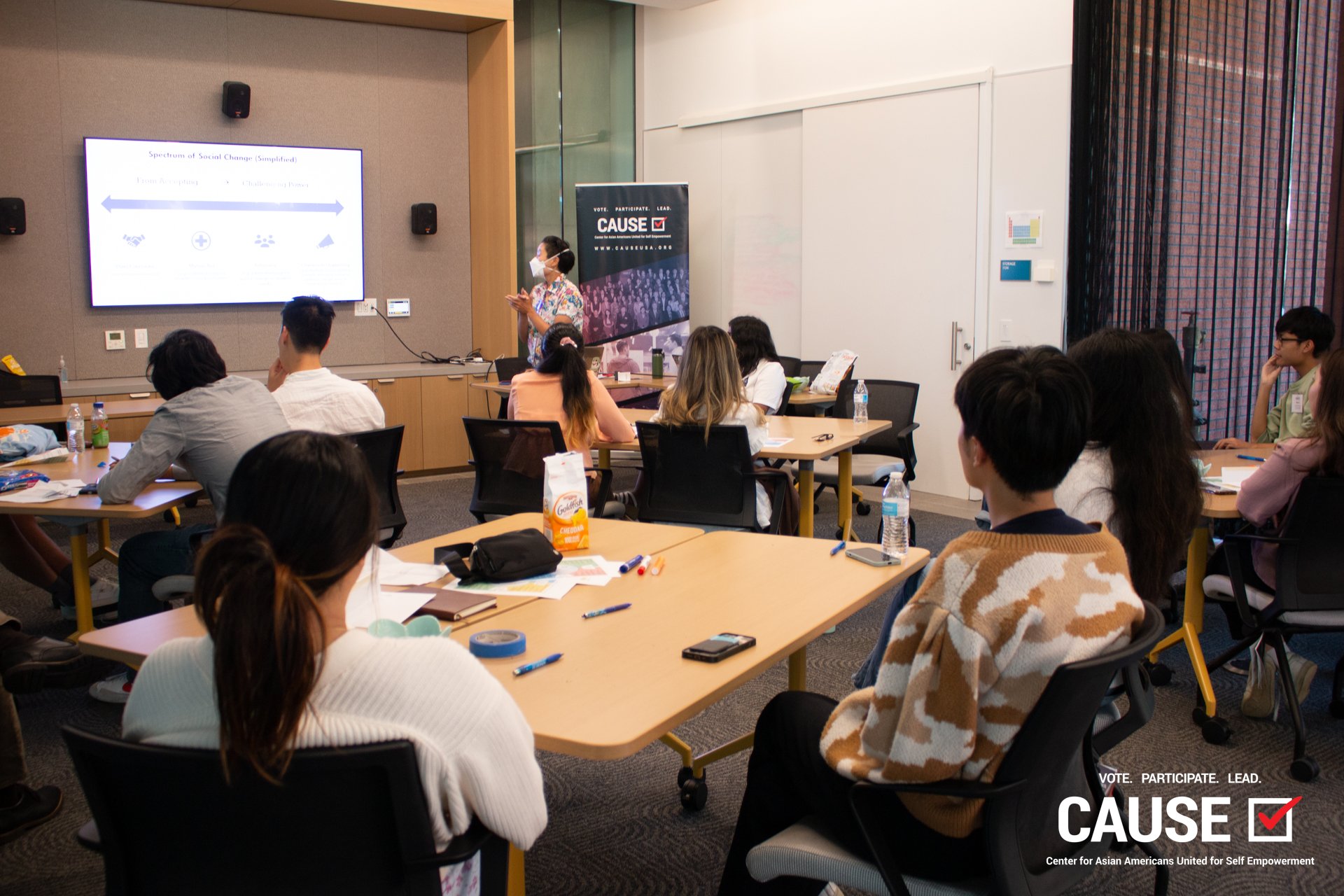There is no uniform understanding of an Asian American identity. The label Asian American originates as an organizing modality–an attempt at consolidating power that emerges from the Third World Liberation Front (TWLF). But in our current moment, I feel that there’s a dangerous depoliticization of the “Asian American” moniker through cultural galas and displays of Hollywood meritocracy that will not and cannot empower our communities. This feeling led me to apply to CAUSE Leadership Academy. I wanted to understand how others understand “Asian American” or “Pacific Islander” racialized identities. Orientation week has simultaneously reinforced and opposed my theories of social change and critical action–growing and testing my understanding of community organizing, identity politics, and racial liberation.
We begin our political education with a barometer activity. Director of Programs at CAUSE Steve Lin asks the cohort, “Work within systems or outside systems?” Shifting to the left side of the room indicates a willingness to work within systems, the right side of the room for those who believe in organizing outside of systems. Most of the CAUSE Leadership Academy (CLA) interns head over to the middle of the room. Along with one other intern, I shuffle to the right of the room, situating myself squarely into the “Work outside of systems” area. I begin describing how though I am invested in the dual power of working against, outside, and within systems, my ideal philosophical engagement with politics involves mutual aid and abolitionist frameworks. Those further in the “within systems” category describe the importance of reclaiming seats of power for Asian Americans within marginalizing political systems.
Electoral politics and working within state systems has always been full of contradictions for me. Obviously, voting is a net-good, but it also reinforces the status-quo. No matter the time period, I’m reminded how state systems were built to oppress us, and I’m looking towards lineages of transformational changes that seemingly always emerge from those who are considered and self-identify as “radical.” I noticed this during our encounter with a guest speaker. They called those who advocate for the abolition of the police as “extremist.” That messaging is certainly in-tune with many self-proclaimed progressive politicians. What I find extremist is our willingness to accept that incarcerating, profiling, surveilling, and murdering racialized community members leads to safety. Thus, my distrust in government and those in authority is based in the material realities of communities that have been let down by our belief in authority and government everywhere. When I’ve canvassed in the past, I then have to ask myself why I am reinforcing cycles of oppressive government through civic engagement.
Dr. May Lin teaches how the Khmer Girls in Action approach community organizing.
Dr. May Lin of CSU Long Beach, however, presented an analysis on the Khmer Girls in Action that grew my understanding of the benefits of local government-based politics. As opposed to state or national elections, for the Khmer Girls, community outreach wasn’t transactional. They weren’t seeking votes for themselves. Instead, the Khmer Girls sought to “build relationships through canvassing efforts.” As Lin pointed out, grassroots canvassing when centered on building community can shift and confront power in transformational ways. The Khmer Girls–their volunteers, activists, and organizers–led a youth movement that won infrastructure and support for multi-racial youth in Long Beach through city council. They relied on their community to bolster their efforts, and thus, the importance of engaging with government on a local level emerges as important.
Talking to fellow intern Emma, I think a lot of us are asking ourselves how we can hold onto radical values while engaging in civic engagement and electoral campaigning. This is a question I hope to further explore and learn from throughout CLA, through not only CLA but through dialogue and engagement with my fellow interns.
The views and opinions expressed in this publication are those of the author and do not reflect the views or positions of CAUSE or the CAUSE network.
Written by Kenny Lê, Leadership Academy 2023 Intern.
The CAUSE Leadership Academy (CLA) for students is a nine-week, paid, internship program that prepares college undergraduates to lead and advocate for the Asian Pacific Islander community on their campuses and beyond.


